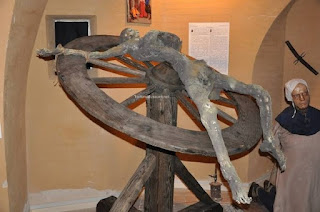The Tragic Tale of Piedad Martínez: A Haunting Glimpse into the Darkness of Desperation
Piedad Martínez, a 12-year-old girl from Spain was someone whose name became synonymous with horror and despair in the winter of 1965-1966.
Born into a large and impoverished family in a small village in Spain, Piedad's early years were marked by hardship and struggle. As the eldest of several siblings, she bore the weight of responsibility from a tender age, tasked with caring for her younger brothers and sisters while her parents toiled to make ends meet. It was a burden that would eventually prove too heavy to bear.
In December of 1965, tragedy struck the Martínez family with a force that would reverberate through the ages. Over the course of a few weeks, four of Piedad's younger siblings fell victim to a silent and insidious killer: poison. As the bodies of her brothers and sisters piled up, suspicion fell upon the eldest daughter, whose behavior had grown increasingly erratic in the wake of the deaths.
Under intense questioning, Piedad cracked, confessing to the unthinkable crimes that had torn her family apart. In a chilling admission, she revealed that she had poisoned her siblings out of a sense of desperation and exhaustion, claiming that she was "tired of having to care for them." It was a statement that sent shockwaves through the community and beyond, prompting soul-searching and speculation about what could drive a child to commit such heinous acts.
The case of Piedad Martínez gripped the nation, sparking intense debate and soul-searching about the plight of impoverished families and the toll that poverty and neglect can take on vulnerable individuals, particularly children. Many questioned how a girl so young could be driven to such depths of despair, while others sought to assign blame and find justice for the innocent lives lost.
In the aftermath of her confession, Piedad was thrust into the harsh glare of the public eye, her face splashed across newspapers and television screens as the nation grappled with the enormity of her crimes. Yet amidst the frenzy of media attention and public outrage, there were those who saw not a monster, but a broken and damaged child in need of compassion and understanding.
As the details of Piedad's upbringing came to light, a picture emerged of a young girl burdened by responsibilities far beyond her years. Raised in a household wracked by poverty and neglect, she had shouldered the weight of caring for her siblings while her parents struggled to put food on the table. It was a heavy burden that had taken its toll, warping her sense of right and wrong and driving her to desperate measures in search of relief.
But even as the nation recoiled in horror at the magnitude of Piedad's crimes, there were glimmers of compassion and hope amidst the darkness. Psychologists and social workers rallied to her side, offering support and guidance in the hopes of helping her heal from the traumas that had shaped her young life. And slowly, painfully, Piedad began to rebuild, finding solace in the knowledge that she was not alone in her struggle.
Today, the case of Piedad Martínez stands as a haunting reminder of the fragility of the human spirit and the devastating toll that poverty and neglect can take on vulnerable individuals. It is a story that forces us to confront uncomfortable truths about the world we live in, challenging us to look beyond the headlines and see the humanity in those who have been cast aside by society.
But amidst the darkness, there is also hope. For in the aftermath of tragedy, there is the opportunity for healing and redemption, if only we have the courage to reach out and offer a helping hand to those in need. And though the scars of Piedad's past may never fully heal, her story serves as a powerful reminder that even in our darkest moments, there is always the possibility of finding light.




Comments
Post a Comment